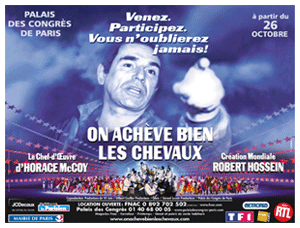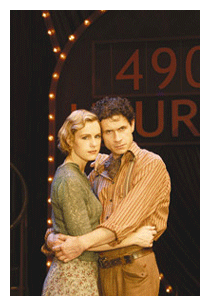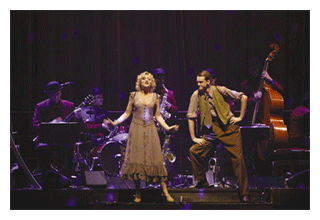On Achève Bien Les Chevaux – spectacle or spectator sport?

- SUBSCRIBE
- ALREADY SUBSCRIBED?
BECOME A BONJOUR PARIS MEMBER
Gain full access to our collection of over 5,000 articles and bring the City of Light into your life. Just 80 USD per year.
Find out why you should become a member here.
Sign in
Fill in your credentials below.
 I never claimed to understand French very well. That’s partly why I’m here in Paris: to study the language. And that’s why, when Mosaico World offered me tickets to a new spectacular, “On Achève Bien Les Chevaux,” I called my friend Jenny and said, “Want to go to an equestrian event?”
I never claimed to understand French very well. That’s partly why I’m here in Paris: to study the language. And that’s why, when Mosaico World offered me tickets to a new spectacular, “On Achève Bien Les Chevaux,” I called my friend Jenny and said, “Want to go to an equestrian event?”
She accepted without hesitation; after all, we’d both grown up in rural Australia with horses, and wouldn’t it be lovely, etc, etc. It wasn’t until we were inside the grand ampitheatre of the Palais des Congrès and saw the massive disco ball and sparkling “Grand Marathon” sign that I wondered if maybe I’d missed something. Jenny—whose French is much better than mine—stared at the sign before saying, “Ooooooh! I saw this in London. ‘On Achève Bien Les Chevaux…’ It’s ‘They Shoot Horses, Don’t They?'”
And that’s how I came to understand that Sunday afternoon’s entertainment was not some horsey gala with guys in chaps “as one with the noble beast” (shame), but the French rendition of Horace McCoy’s classic novel (fine, loved the movie). Set in the Great Depression, it’s the tale of 15 couples who, needing the prize-money, subject themselves to the torture that was the dance-athon, a suffering that could go on for weeks while the audience cheered and jeered. Entertainment for those who’ve already lost their minds, I suppose, as they watched others lose theirs. The show opened with Sylvain Rougerie firmly in character as the unctuous MC “Rocky,” laying down the rules to the competitors—desperate, disparate people brought together by the most basic need: survival. Although the poster shows the dancers dressed in colorful outfits, their stage costumes were drab and worn, in keeping with the dark times they lived through. In contrast, the music—superbly played by a six-piece band—is obscenely perky as the backdrop to this tale of lost souls seeking not only the reward, but purpose in life. Playing the role of “Gloria,” which netted Jane Fonda Oscar and BAFTA nominations back in 1969, Anne Richard is tough, bitter and compelling. But she’s almost overshadowed by Gwenaelle Deram, whose “Janet” starts out as insanely chirpy as Ally McBeal’s “Elaine,” and just ends up insane. Also noteworthy is Vincent Guillard, playing “Robert,” Gloria’s gentle partner.
The show opened with Sylvain Rougerie firmly in character as the unctuous MC “Rocky,” laying down the rules to the competitors—desperate, disparate people brought together by the most basic need: survival. Although the poster shows the dancers dressed in colorful outfits, their stage costumes were drab and worn, in keeping with the dark times they lived through. In contrast, the music—superbly played by a six-piece band—is obscenely perky as the backdrop to this tale of lost souls seeking not only the reward, but purpose in life. Playing the role of “Gloria,” which netted Jane Fonda Oscar and BAFTA nominations back in 1969, Anne Richard is tough, bitter and compelling. But she’s almost overshadowed by Gwenaelle Deram, whose “Janet” starts out as insanely chirpy as Ally McBeal’s “Elaine,” and just ends up insane. Also noteworthy is Vincent Guillard, playing “Robert,” Gloria’s gentle partner.
The audience plays its part, as well. A few actors were placed in the pews to pop up and either cheer on or berate the dancers, while “Rocky” called for our opinions on who should win. But when it came time for the brutal derby, in which the by-now-miserable dancers are forced into a heel-and-toe race through the audience, things turned somewhat bizarre. Because most of the audience—the general public—behaved as I imagine the audience of those dance-hall days would have: cheering and clapping in time, as if this were grand fun, rather than dozens of half-dead people (including one heavily pregnant character), in a fight for survival. Jenny and I found it disturbing; everyone else just seemed to find it fun. There goes that cultural thing again.
The lights came up for half-time, and out wandered an older guy. A loud murmur went through the crowd, then a solid round of applause. He commandeered a microphone and invited volunteers to get up on stage, with the dangling carrot of a free photo of your participation, to be picked up after the show. Being Australian, I instinctively hunched down in my chair, but about sixty hands shot into the air. And then it was on for young and old, literally. One 88-year-old woman was paired with a much younger man, while a kid in camouflage gear found his match in a matron from the suburbs. And let’s not even mention the guy with the graying beard half-covering his beer belly and Harley Davidson t-shirt. This was not your typical Parisien audience, but we couldn’t quite figure out why.
Long after people were paired off and ready to jive, the guy with the mike kept going on. And on. I didn’t catch much of it, by that time too interested in my pistachio Cornetto, just heard some references to God and sharing and “terrible times in this world.” Jenny sat in stunned horror. “He’s an evangelist!” she whispered. “Oh my God, it’s my worst nightmare: stuck in some French reality show!”
I turned to the woman beside me and asked who he was. “Robert Hossein,” she told me, looking at me as if to ask, “Where are you from?” (Well, actually, madame…) That’s when I remembered seeing his name on the posters plastered all around town. I also remembered seeing the words, “Come! Participate!” Ok, gotcha. I slumped lower in my chair.
The band started up and the volunteers got to it. First a waltz, then a samba, tango, and finally, rock. Apart from one couple who knew how to tango and just couldn’t resist letting everyone else know it, everyone else pretty much jiggled in place. And that’s when I came to the conclusion that people the world over all have the same dance moves. I could have been in Melbourne or Singapore or Moscow. But the wonderful part was that, like people all over the world (give or take a despot or two), they just wanted to have fun. And they were thoroughly enjoying themselves, twisting and shaking with people they’d only just met. Hossein had achieved what he wanted: sharing.
After the dancers left the stage, laughing (and with quite a few middle-aged women clinging to Hossein’s hand until he politely extracted himself), the show started back up. And while the music was still cheerful, the stuporous characters were rapidly shuffling into hell, not helped at all by Rocky, whose sole aim was to provide a good show—no matter how ugly that might become.

Mosaico World offers tickets to many Paris events—musicals, concerts, and sporting events, amongst others. If you don’t see the event you want on their site, mail them and they’ll find it for you. They’ll also work out a personal list, tailor-made to suit your tastes and desires, and will deliver the tickets to you, wherever you are in the world.


